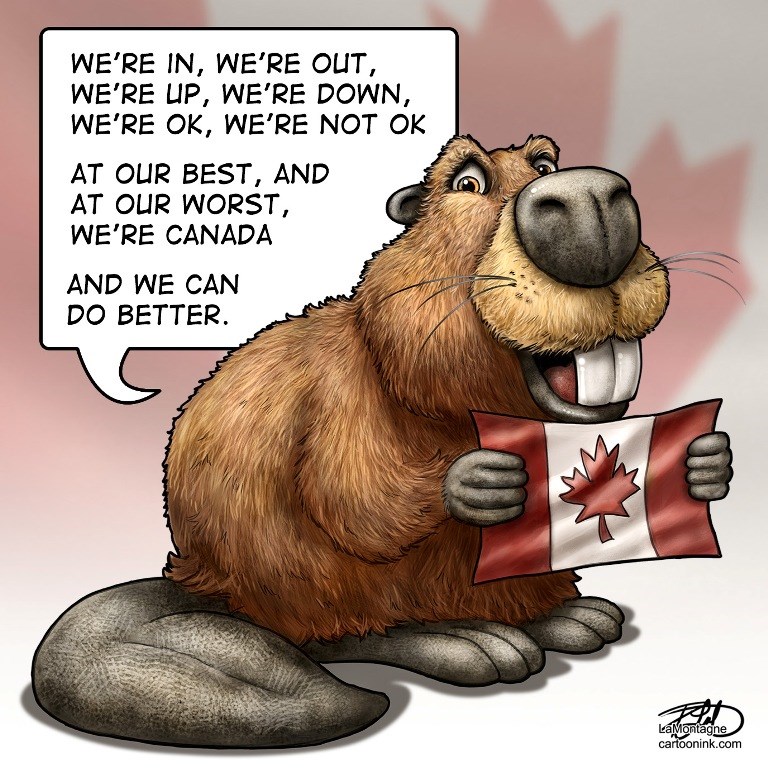Drawing an editorial cartoon or illustration for Canada Day is usually fun, and most of the time, without controversy.
This year, however, with all we’ve been through living with the virus and coming to terms with the darkest parts of our nation’s history, July 1st will no doubt be a day of reflection for many.
With the discovery of more unmarked graves at former sites of Indian residential schools, Canadians are once again coming to terms with our past.
We have long pretended that we walk the high road, especially when comparing ourselves to other countries. We have prided ourselves in С����Ƶ polite, friendly, and first to come to the aid of others in need, even when we weren’t any of those things.
But we were never on firm ground while walking that road because we’ve always known our own history, even when we chose to ignore it. These graves might be new physical evidence, but what went on at residential schools was never a secret.
In 1922, Dr. Peter Henderson Bryce wrote a whistle-blowing book entitled “The Story of a National Crime: An Appeal for Justice for the Indians of Canada.”��He had submitted a report in 1907 to the Department of Indian Affairs that was largely ignored.
It wasn’t until 1958 that Indian Affairs regional inspectors recommended the closure of all residential schools. The last one didn’t close until 1996.
One of the most overused clichés surrounding Remembrance Day in Canada, when we remember our fallen service members on November 11th, is the phrase ‘Lest We Forget.’
It has become more of a tagline, something companies can put on their ads, and individuals can share online because they’re supposed to. It almost feels like saying ‘Bless You’ when somebody sneezes, a courtesy without meaning. It’s just something you say.
But Lest We Forget is important. It’s about remembering your past so that you don’t repeat it.
Despite our bad habits on social media, where we are quick to point out the failings of others, comparing our best traits to their worst, there isn’t one of us who would have all of our past sins laid bare for public scrutiny. We are fallible and damaged; we are human.
We tear down statues and spit on the ground when we say the names of the architects of the residential school system, but we conveniently forget that Canadians elected these people. Many of those native children are alive today, and they’re not as old as you might think.
This is not ancient history. It happened in our lifetime, much more recently than the world wars we remember each year without fail.
We point the finger at our past leaders and say that they should have done something, but that’s the easy way out. It’s also easy to blame the current leadership and say that it’s their fault, but most of the time, that’s simply partisan politics. We switch political parties in this country more than we switch vehicles.
A hundred years from now, our descendants will not look kindly on our inaction. Such is the luxury of hindsight. ��Our behaviour during the pandemic, how we treat our most disadvantaged citizens, our obsession with moral grandstanding on social media, and our disregard for the threat of climate change, the ground on which we stand is indeed shaky.
But we can change. We can have more empathy for our fellow travellers. We can try and put ourselves in another’s shoes before passing judgment on the narrow snapshot we might see of them. These are choices.
Some municipalities have cancelled their Canada Day events, others are going ahead with the party, and more are still on the fence. Individuals must decide for themselves.
I don’t agree with scrubbing away our history, nor do I support daily self-flagellation. Neither accomplishes much of anything. We should know our nation’s past, reflect on it, and learn from it.
Remembrance is not just about the wars we won, but our collective history as a nation, the good and the bad.
Lest we forget.
Patrick Lamontagne is a cartoonist and digital painter based out of Canmore, Alta.
��




